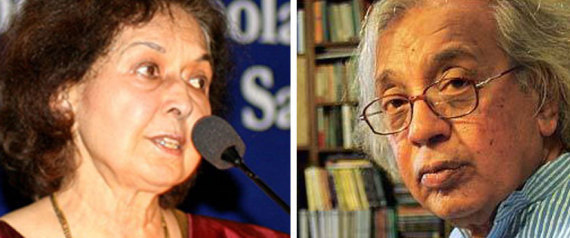
Nayantara Sahgal (L) and Ashok Vajpeyi: Both returned their Sahitya Akademi awards
The autumn of 1975 was a turbulent one. It was the autumn when Emergency was imposed. Having resigned from the office of Additional Solicitor General of India in protest against its imposition, the celebrated jurist Fali S Nariman would spend his quiet evenings at Delhi's Nehru Park. Occasionally, he would be joined in his evening walks by the then High Commissioner of Australia Mr Bruce Grant.
In his autobiography Before Memory Fades, Nariman recalls one such walk and documents what the High Commissioner told him of his encounter with Indira Gandhi:
"Indira Gandhi had expressed shock and surprise at the total lack of resistance among people to the Emergency. She particularly mentioned... that she was more amazed at the lack of reaction among the intelligentsia!"
Nariman later writes in his autobiography:
"When times are bad, this category -- the intelligentsia --is the most despicable in all countries. It is the intelligentsia that has both the capacity and inclination to rationalise the tyranny."
These words of Nariman merit consideration, and the wisdom of the past always serves as the lesson for the present and the future.
I am neither being alarmist nor presumptuous enough to imply that we are headed to times as hard and as detestable as the imposition of Emergency. However, I am sensible enough not to dismiss as a careless trifle the voice of the intelligentsia, especially when it breaks the academic inertia and intellectual lethargy that Nariman is alluding to.
A debate has ensued since a series of decorated academics and members of the intelligentsia returned their awards in protest against the establishment for seemingly condoning acts of intolerance.
The issue is politically charged. However, its ramifications extend beyond the arena of partisan politics and into the wider realm of sociology and political philosophy of the country.
Therefore, steering safe of the partisan debates, we must dwell upon several wider aspects of the debate.
Certain political commentators and politicians like Shashi Tharoor, while upholding the spirit of protest, have criticised the method of protest. These detractors hold that returning a literary or an academic decoration serves the intended purpose less than it communicates contempt and a dishonour of the award.
Such arguments may have logical merit but may not carry much substance especially in view of the tremendous gravity of the situation. The act of returning an award is not simply an issue of honour or dishonour of that award. The act is a bold statement that the intelligentsia, having sensed the pulse of the times, has dared to make. The grammar of the statement may be questioned but neither its gravity nor its substance can be dismissed or diminished in any way.
A second criticism is rather more serious. The Hon'ble Finance Minister, in a Facebook post described the movement as "manufactured revolt" and dismissed the protestors as politically motivated and ideologically biased.

The Hon'ble Finance Minister has described the movement as a "manufactured revolt" and the protestors as politically motivated and ideologically biased. (Source: SIFY, Image Courtesy: Satish Acharya)
While it cannot be denied that a few of these academics have shown a particular ideological bent in the past, this can in no way be used to assert that their standpoint is illegitimate or their collective statement lacking in merit.
After all, it is the intelligentsia which has been the conscience-keeper of all social and political ideologies. All great ideologies that shaped the world and sculptured history were once incubated in the warmth of university campuses and nurtured by the hands of academics.
If the flawed logic of the Finance Minister's arguments is accepted, it would mean that no ideological protest can ever be held legitimate. One could use grounds similar to Jaitley's to dismiss the ideological reaction against Hitler's anti-Semitism as "ideologically motivated" or "politically manufactured". One could on similar grounds have rejected the ideological upsurge against the tyranny of Mao Zedong or choked the voices of perestroika (reform) and glasnost (openness) under the communist dictatorship of the USSR.
The Hon'ble Finance Minister's argument is found wanting on two counts. First, the very premise that the voices of academics are politically motivated, and not the voices of their conscience, is politically biased. Second, even if there is a political aspect to the statement that the intelligentsia is attempting to make by returning decorations, it in no way delegitimises or blemishes their standpoint or weakens the strength of their arguments.
Jurist Nariman was absolutely right in saying that the intelligentsia is despicable when it displays "both the capacity and the inclination to rationalise tyranny." However, his postulation was incomplete, for he forgot to add that it is only the intelligentsia that also wields the capacity and inclination to resist tyranny.
It is the intelligentsia which, like in any other country or society, is the conscience-keeper of the very idea of India and the sanctuary of the fundamental philosophy of the nation.
 Like Us On Facebook |
Like Us On Facebook |  Follow Us On Twitter |
Follow Us On Twitter | Also see on HuffPost: